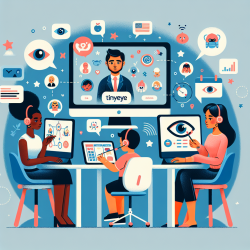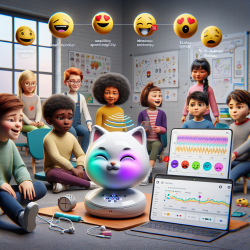Individualized Education Program (IEP) planning and meetings are crucial components in ensuring that students with special needs receive the appropriate support and resources. As funding agencies, you play a pivotal role in this process, helping to allocate resources effectively and ensuring that each child's unique needs are met. In recent years, online therapy services have emerged as a valuable tool in this realm, offering a flexible and effective means of delivering specialized support.
One of the most significant advantages of online therapy services is their ability to provide consistent, high-quality support regardless of geographical limitations. This is particularly beneficial for rural or underserved areas where access to specialized therapists can be limited. By leveraging telepractice jobs, schools can connect with certified therapists who can deliver speech therapy, occupational therapy, and other specialized services directly to students via secure online platforms.
During IEP meetings, it is essential to consider how online therapy services can be integrated into a student's plan. Here are some key points to discuss:
- Accessibility: Online therapy services ensure that students receive the support they need without the constraints of location. This can be particularly helpful for students who live in remote areas or for those whose schedules make it difficult to attend in-person sessions.
- Consistency: Online therapy can offer more consistent support, as sessions can be scheduled flexibly and are less likely to be disrupted by factors such as travel or therapist availability.
- Engagement: Many students find online therapy sessions engaging and interactive. The use of digital tools and resources can make therapy sessions more enjoyable and effective.
- Cost-Effectiveness: Utilizing online therapy services can often be more cost-effective than traditional in-person therapy. This can allow for better allocation of resources and potentially provide more students with the support they need.
As you prepare for IEP meetings, consider how TinyEYE's online therapy services can be incorporated into each student's plan. Here are some steps to help guide this process:
- Assess the Student's Needs: Begin by thoroughly assessing the student's needs and determining which types of therapy services will be most beneficial.
- Explore Online Options: Research and explore online therapy services that specialize in the areas identified. TinyEYE offers a range of services, including speech therapy, occupational therapy, and mental health support.
- Consult with Stakeholders: Discuss the potential for integrating online therapy services with teachers, parents, and other stakeholders. Ensure that everyone understands the benefits and how the services will be delivered.
- Develop the IEP: Incorporate the chosen online therapy services into the student's IEP, outlining the specific goals, frequency of sessions, and methods of evaluation.
- Monitor Progress: Regularly monitor the student's progress and make adjustments to the IEP as needed. Online platforms often offer tools for tracking and reporting progress, making it easier to stay informed.
Incorporating online therapy services into IEP planning can significantly enhance the support provided to students with special needs. By ensuring that these services are considered and integrated effectively, you can help to create more robust and effective IEPs that truly meet the needs of each student.
At TinyEYE, we are dedicated to helping schools and funding agencies deliver high-quality therapy services to students, no matter where they are located. Our team of certified therapists is ready to support your efforts and help make a positive impact on the lives of the students you serve. If you are interested in learning more about how our online therapy services can be integrated into your IEP planning, please don't hesitate to reach out.
Let's work together to ensure that every student receives the support they need to thrive.










